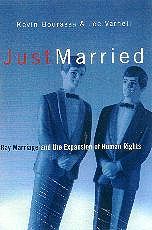
GAY MARRIAGE?
Wrong question
QUICK PREVIEW:
Sacred cause? Or savvy con-job?
Postscript as prologue
With "the ultimate human right" granted
by Liberal largesse to the comfortably coupled,
what fate awaits the rest of us?
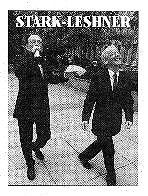
Poster boys on parade
But who's on first?
Perennial "spousal rights" & "gay marriage" media stars flaunt their newly legal newlywed status, June 10, 2003. Self-promotion, with champagne, in the Jun 26 Pride issue of Xtra!, captioned (in part):
"Michael Leshner and Michael Stark affectionately known throughout Toronto especially the gay community as 'the Michaels,' most happily announce that their historic same-sex marriage took place in Toronto on Tue Jun 10 at the courthouse at 362 University Ave presided over by Mr Justice Hamilton of the Supreme Court of Ontario.
"In attendance was the world."
If not quite for the first time. In Jan 2001, "Just Married" Joe Varnell & Kevin Bourassa had played host to "film crews from as far away as Germany & Japan" for, as the Toronto Star put it, "Gay vows covered like a royal wedding."
Okay: They won. The two famous "Michaels" can prance with champagne. Bann-conjoined Kevin Bourassa and Joe Varnell can say they're married in the eyes of the law, not just the Metropolitan Community Church. Anne and Elaine Vautour can too, hitched by the Reverend Brent Hawkes in that "very public double marriage" of January 14, 2001. All that's left to fight over is the blue-ribbon trophy: The First Truly Married Same-sex Couple in Canadian History!
Well, maybe.
You'll note I've said "they" won. Not "we." I'm not sure who "we" may be any more. I wonder where this "victory" leaves so many of us -- of any sexual orientation -- whose relationships don't fit the respectable matrimonial model. As a friend of mine said after hearing Brent Hawkes, on national TV, suggest that marriage is the ultimate human right: "Gee, what about having enough to eat? A roof over one's head? How about freedom?"
When the rice and confetti have been swept away, the champagne long gone flat, many of us will find our lives have suddenly become not more free, but less.
And sudden it was. After years of slog through the courts a court had ruled, in the case of the Stark-Leshners, the Bourassa-Varnells, and other Ontario couples fighting refusal of their marriage licences, not only that legal bans on same-sex marriage are unconstitutional (other courts had said so before, if giving governments some time to figure out how to put things right) but that, effective immediately, they no longer held sway. Gay couples in this province could be legally married that very day. The Michaels rushed to "make history."
That June 10 ruling of the Ontario Court of Appeal was not just sudden but rich with irony. Among the three presiding judges (and, it seems, not accidentally) was Ontario's chief justice: Roy McMurtry. He is best known in local gay history for his earlier role as attorney-general -- that good Catholic behind the 1977 bust of The Body Politic, and the massive Toronto bath raids of 1981.
Seems Roy wanted to write a more noble page in that history. And he did win a shot with Kev & Joe on their "equal marriage" website, all three beaming bright.
The feds might have appealed that ruling, as they had every judicial "Yes" to gay marriage. They turned for advice to the House of Commons justice committee, just back from its cross-country tour seeking "public opinion" on the issue -- if witness to little more than a two-ring circus of competing fundamentalisms, Religious Right vs Gay Right. The committee -- yet to report on its raucous road show -- was itself a house divided, deadlocked in simplistic defence of either "Yes" or "No."
On June 12, in a 9 to 8 vote on a motion by gay MP Svend Robinson, the committee said No to an appeal. Hence: Yes to gay marriage. Svend of course called the vote "historic" -- if admitting, as The Globe reported: "The motion passed only after the Liberal whip replaced Liberal committee members who oppose such unions with MPs who are in favour of them." Behind that whip, "Mr Robinson indicated he believes," was justice minister Martin Cauchon -- who, as we'll see, had clearly come around to The Cause.
On June 17, prime minister Jean Chrétien told the world that Canada was ready for gay marriage. And would have it, everywhere -- once the Supreme Court had opined on legislation the feds had in the works, hoping it would prove not just constitutional but immune to further challenge. Its draft text read, in part:
- "Marriage, for civil purposes, is the lawful union of two persons to the exclusion of all others." And: "Nothing in this Act affects the freedom of religious groups to refuse to perform marriages that are not in accordance with their religious beliefs."
The government pushed the court to give its blessing as soon as possible. Then it would ask Parliament for one, in a free vote of each member's conscience -- a vote the Liberals looked sure to win. The media told us the whole thing would be over by November, well in time for Jean Chrétien, due to depart as prime minister not long afterwards, to add a final grace note of Liberal largesse to his historic legacy.
So, at last: Formal equality. And freedom of religion secured too. Is everybody happy? The PM clearly bet we all would be. But it's a bet he stands to lose.

Uh oh....
National Post, July 18: Federal justice minister smells trouble.
The right railed on (in the moment rightly so) over arrogant Liberal machinations, and (as ever) fretted perniciously progressive "judicial activism" -- their rants inflamed by smug "in the know" media pundits; Jeffrey Simpson in The Globe would scold: "Forget the preaching, gay marriage is a done deal."
But even Liberal backbenchers felt stung by that "whipped" vote, many groaning under masses of mail -- "the biggest reaction I've seen in 10 years," one said -- nearly all of it demanding they defy their leaders and rise to defend the sacred institution of marriage. Some dared say that when it came time for that free vote, they would vote the conscience of their constituents. Or, perhaps, their most vocal ones.
A week before the prime minister's announcement, polls (for whatever they may be worth) showed 54% of Canadians could accept gay marriage; within weeks the figure dropped to less that half. Ontario premier Ernie Eves, long live-and-let-live on the issue (he lives "in sin" with sister Tory Isabel Bassett), clearly had his finger in the wind: "I happen to personally believe that marriage is between a man and a woman."
That shifting wind was fanned by massive media coverage going well beyond likely changes in Canadian law -- and even beyond Canada. In June the Texas sodomy law, making consensual sex between adult men a crime, had been struck down -- raising US panic over sodomites unleashed and, heaven forbid, even married. George W Bush, if allowing that "we all are sinners," said he would never sanction the sin of gay marriage.
The US Episcopal Church was getting live coverage on CNN, risking its place in the global Anglican Communion for electing its first gay (well, openly gay) bishop. The Pope chimed in, warning Catholic politicians not to subvert "the natural moral law." The Bishop of Calgary told Jean Chrétien (a Catholic if, like any decent Canadian pol, never flaunting his faith) that he was putting his "eternal salvation" at risk.
And the Supreme Court let on that he risked a long wait for their word. They would not be rushed; this was not a national emergency, the fate of his legacy notwithstanding. That free vote won't come until after he's gone, leaving Paul Martin, his inevitable successor, to face increasingly likely legislative embarrassment.
And potential legal chaos: might the married be unmarried? Some who rushed civic altars may in time hope so: right now there is no way in law for same-sex couples to divorce.
The word "marriage" did not cross Chrétien's lips in that June 17 announcement. He spoke of legal recognition of "civil unions." Had he left that option open, he might have caused less consternation.
Stern opponents of gay marriage -- among them Catholic priests sermonizing on papal orders, even Stephen Harper, leader of the right-wing Canadian Alliance -- have said they could live with legal recognition of same-sex couples. As long as they're not called "married." Peter McKay, new leader of the Progressive Conservatives, who had said as an MP that there are surely more pressing issues than gay marriage -- if, as it pressed, sought compromise -- proposed on August 13, as reported inThe Globe:
- "...the government should simply create a new institution called 'registered domestic partnerships' that would be used for all couples, heterosexual or homosexual. Only churches would perform 'marriages,' and each church could decide whether to marry same-sex couples. '[The government] would get out of the marriage business altogether,' Mr McKay said."
Scott Brison, sole openly gay Tory MP, said he'd support gay marriage if it came to a vote but, the same Globe story reported, "prefers 'registered domestic partnership' that would take the state out of marriage." Some other Tories agree. Alliance MP Keith Martin "said he also believes such partnerships are the best option." Liberal Karen Redman has promoted among her party's MPs a proposal "nearly identical."

Flexible options
The Law Society of Canada's Jan 2002 report on "Recognizing and supporting close personal adult relationships." Asking whether legal rights should depend on our sex lives, offering sensible answers-- & ending up utterly ignored.
These ideas are not new. In 2000, the government had asked the Law Commission of Canada, an independent federal agency, to explore options for changes in the raft of laws that effect close personal relationships between adults. In its January 2002 report the LCC made recommendations also "nearly identical."
If going well beyond. Their report's title: Beyond Conjugality. It went way beyond "Gay Marriage Yes or No," even beyond marriage, asking a deeper question: Why should legal rights depend on whether or not people are having sex? Conjugality, they said, should have no place in law. Just as -- to quote Pierre Trudeau in 1967 -- "the state has no place in the bedrooms of the nation."
They proposed that laws affecting intimate human connections take into account "the range of relationships" relevant to a law's intent. And that legislators framing such laws respect some fundamental values: equality not just between but within relationships; freedom of conscience and religion; personal security, autonomy -- and freedom from "unwarranted state intrusion."
You can find elaboration of these principles (and much more on Beyond Conjugality) in Gay Marriage? Wrong Question. They call into question not marriage, but marriage as the only model of relationships recognized in law -- imposed on couples involuntarily defined as married in common law, subject to no little "state intrusion."
For the LCC, all this led not to mere fiddling with existing marriage and family law -- but to new laws recognizing relationships beyond the fixed frame of traditionional "marriage" and "family." And beyond conjugality: any committed connection of mutual support that people define for themselves and want to declare -- whether or not they are having (or are presumed to be having) sex -- deserves respect in law.
That respect could be achieved by state recognition of a range of relationships -- including but not limited to marriage -- through civil union or "Registered (if not always Domestic: marriage doesn't have to be) Partnership."
But these idea have been widely ignored. Beyond Conjugality got almost no media play. The justice department's November 2002 "discussion paper," Marriage and Legal Recognition of Same-sex Unions, declined to discuss it (or to break the "Gay Marriage" frame), dismissing it with a footnote, saying it "focused mostly on people in non-conjugal relationships."
In fact, it had looked at relationships both conjugal and not, if clearly focusing on those non-procreative: adults without children -- as many gay (and, increasingly, non-gay) people are. Putting kids and their needs into the picture, they knew, would lock their thinking in a frame many of us do not fit: "marriage" and "family."
Still, Justice wonks, despite their cursory reading, did include among their three legal options (the first two essentially "Gay Marriage No" and "Gay Marriage Yes") this:
- "removing all federal references to marriage, and replacing them by a neutral registration system for all conjugal relationships, leaving marriage exclusively to individuals and their religious institutions."
That was Option 3. But Option 1 (Gay Marriage No) offered a curious sub-option:
- "restating the opposite-sex meaning of marriage in the preamble of a new piece of legislation that would create an equivalent to marriage for federal purposes (either civil union or domestic partnership) for other conjugal relationships."
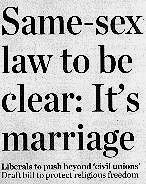
Fixed option
Toronto's Saturday Star, Jun 28, makes it clear: Marriage! Not mere "civil union."
"RDP" is an evil acronym for gay marriage mavens, avid in their demand for absolute equality in words: It's Marriage, dammit! Anything less is "separate but equal" second-class citizenship. Even justice minister Martin Cauchon, having refused papal orders, now reads from the Catechism of Gay Marriage Sanctimony (you can find its mantras unmasked in "Platitude: attitude," part of Gay Marriage? Wrong Question), as reported in The Globe on August 13:
- "'It's a question of equality. It's a question of rights. It's a question of dignity ... Less than equal is less than adequate.' Cauchon said creating another institution such as civil unions or registered partnerships 'would contribute to the fact that we would tell those members of the gay and lesbian community that they are not entirely part of our society.'"
And, under the justice department's Option 1B, he's right. But, blinded by the rite, he seems unable to see his own officials' Option 3: creating a single "neutral registration system for all conjugal relationships."
If people joined in religious rites had to register -- should they want the state to regard them as conjoined in law as well -- no one, whether "married" or not, would be any less a citizen. Citizenship derives from the state, not the church. A single system would make everyone truly equal -- as citizens. The only things separate would be, as they should be, religion and Canadian law.
Peter McKay proposes a system "identical for same-sex and heterosexual couples." Yet Cauchon has blithely ignored that option, casting any civil set-up as "separate but equal" -- straight-only "marriages" and second-class "gay unions." The media have followed his blinkered lead: Globe editorialists have called the search for options "morally bankrupt."
Everyone knows Option 1B would violate the Charter of Rights, giving gay marriage mavens yet another case. And, cases being precisely what the feds hope to avoid, they are made nervous by the mere mention of options short of formal equality in words. Even options that might well pass judicial muster: as substantive equality in citizenship.
The Globe said on August 2: "This huge debate boils down to one word." As the Star's blaring headline of August 13 made clear: "It's marriage, PM insists."
The LCC, seeing "many principled advantages" in going beyond marriage, had allowed that its January 2002 proposals might not be "very attractive to a majority of Canadians." Now those ideas, admittedly radical, are seen as a "less controversial" compromise, mere second-best. In fact -- if we look beyond formal equality for some to substantive justice for everyone -- they are far better.
With the Liberal caucus in revolt, the PM (or Paul Martin) may have to look beyond. Gay marriage is far from a "done deal." And we may at last realize that morally sound (and politically sensible) options are right before our eyes. If we could see them.
The media's issue
Recognition of a varied range of intimate relationships? Not so's you'd notice from the headlines:
Liberals to fight gay ruling
National Post
Jul 30, 2002, p 1
Cabinet takes aim at casting same-sex policy
Globe & Mail
Aug 1, 2002, p 1
Government steers vote on
accepting same-sex ruling
Globe & Mail
Jun 13, 2003, p 5
Same-sex debate
to outlast PM
National Post
Aug 2, 2003, p 1
Priests carrying
same-sex attack to pulpit
Globe & Mail
Aug 3, 2003, p 1
Liberals planning revolt
on same-sex
Globe & Mail
Aug 7, 2003, p 1
Liberals could lose
same-sex free vote
Globe & Mail
Aug 14, 2003, p 1
The media have not let us see. Thoughtful analysis of the sort offered in Beyond Conjugality simply doesn't fit soundbytes, "headlinese," or their favoured if facile "Yes / No" frame. "Gay marriage" does -- deliciously. Edward Greenspon, editor of The Globe and Mail, wrote in its August 9 issue:
- "From a journalistic perspective, the same-sex marriage issue has it all. There is personal morality and personal freedom. There is the role of some of the mightiest institutions in our society -- the courts, the legislatures, the churches. There is the tension that inevitably occurs in societies in transition...."
Best of all, there is controversy. And ample opportunity for self-congratulation at how noble journalists brave such messy stuff: the piece was titled: "Purposely shining a bright light on the difficult issue of gay marriage." Ed assures us of his own liberality, telling tales of college roommate Kevin, "a droll, devout Catholic" who, "beneath his wicked wit," was "a deeply troubled guy." Kevin eventually "adopted a gay lifestyle." In the mid-1980s, Ed and his wife visited him often. As he died of AIDS.
We are ever noble, and safe, as victims.
Editor Ed also assures us, despite his personal sentiments and Globe editorials "strongly supportive of the extension of gay rights, including the right of homosexual couples to legally marry," that the task of his paper's "news reporters is to describe the world as it is, without fear or favour." They are, after all, brave and noble journalists.
So: perhaps it's merely the pressure of headlinese that has reduced complex questions of human relationships to nothing more than "gay marriage." Or "same-sex marriage." Or just "same-sex." The Globe's "bright light" -- nor any other dazzling media beam -- has rarely shined on the real issue at stake, made clear in Beyond Conjugality: What role should the state play in our intimate lives? In particular, the lives of adults without dependent children?
It has been aimed instead at "same-sex." The media's real issue is us.
With "gay marriage" the only question, what's truly put in question is "gay" -- the legitimacy of our very lives. What's put beyond question is "marriage."
A system rooted in rights of property, long treating women and children as property; an institution long critiqued by feminists, social activists, children's rights advocates, gay liberationists; an edifice visibly crumbling -- has become the Gay Holy Grail. And the Religious Right's Resanctified Turf, rooting "Be Fruitful and Multiply."
When did we last hear anyone going on about "patriarchal oppression"? Yet we hear again, endlessly: "God made Adam and Eve, not Adam and Steve." What passes for "public debate" on our most intimate connections now takes place on the turf of so-called "morality." We have deserted the realm of real social justice.
Among the most avid deserters have been many in what we're content to call "the gay community." In 1982, Ken Popert wrote in The Body Politic: "The imposition of widespread marriage-like coupling inevitably goes hand in hand with the abolition of that community." In the issue of Xtra! where The Two Michaels pranced, we also got this notice: "After 29 years together, Ken Popert and Brian Mossop proudly announce that they are NOT GETTING MARRIED!" Bravo! Looks good on you, boys.
But it would have looked better on Ken if he'd spoken up sooner. As president of Pink Triangle Press he has allowed Xtra! (as I say in extensive coverage of their coverage, led off by a piece called "Fucking confused") to "roar down the gay marriage track like a runaway locomotive -- its engineers occasionally leaning out of the cab to ask dazzled bystanders: Where are we going?"
Ken's hands-off role has honourable motive: an ancient activist, he doesn't want to throttle young "journalists." They were left free to turn what might have been a fertile forum of public discussion into an intellectual desert.
Canada's biggest gay paper has helped set the climate in which a flak for our "national gay rights lobby" can laud marriage as "a central social institution." In which gay MP Svend Robinson can say society has nothing to fear from homo matrimony: "It will reinforce the institution of marriage."
And in which TV's favourite gay cleric can say (on TV; I'm paraphrasing): If a friend got sick, you wouldn't want to bear that burden. But for a "spouse," you would.
This after decades of communal caring, friends devoting their lives to sick friends. How soon we forget. And how willfully: this breathtaking disparagement of who gay people, at our best, have been is now common coin among those avid for the "right" to be "just like everybody else." We're meant to celebrate that "man and woman" has been replaced by "two persons" -- in a phrase that ends: "to the exclusion of all others."
As Jane Rule (whom you'll also find here) lately wrote me: "the community we were working for in all its loving diversity, requiring of us all courage, imagination, humor, tenderness" is now "reduced to the right to 'marry,' to withdraw into the isolating conventions which allow and even justify neglect of other cares and commitments."
Many of us seemed thrilled to trade what Jane has called "lives of our own invention" -- lives that have taught us not just courage and imagination but honestly, generosity, civic decency -- for admission to the privatized realm of Sacred Marriage.
So: Welcome to the Real World! To "social stability"! To "respectable" possessiveness, routine hypocrisy, socially "acceptable" jealousy; to "sleazy" secrets, hurtful lies, painful guilt; to "casual cheating," "illicit affairs," "scandalous adultery"; to divorce, alimony and vicious custody battles over everything from the BMW and the "family" silver to dogs, cats, or kids. To lives enriching lawyers -- if leaving many of us emotionally, and even financially, impoverished.
And all for a single word.
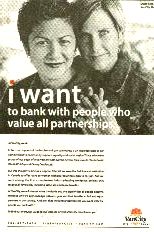
All partnerships?
VanCity bank ad in Xtra West! Comfortable coupled? Double income? Mortgage-worthy? Hey! You're valued! If not -- well...
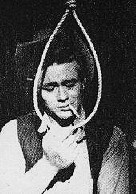
Even avid marriage advocates admit that their "victory" is mostly symbolic: very few substantial rights accrue to couples formally "married" that do not apply to people conjoined in common law -- but for the right to be free of "unwarranted state intrusion." And to be called "married."
This grand struggle over one word has ever put symbolism over substance, sentiment over sense, "respectability" over true self-respect. What might have been an effort to win legal respect for a range of human relationships was instead made a "gay issue." By gay people themselves -- finding it "strategic" to play oppressed victims.
We might have been bold visionaries: casting our varied ways of life as models for a more humane future. It was much more comfortable, if also more craven, to whine for "equality" with the status quo.
Still, this vacuous "debate" has also exposed a useful truth -- one that anyone who casts a critical eye on what the media pass off as "news" already knows: the precious feeling and coddled fears of the anxious middle class always count for more than the material realities of welfare moms, indigent kids, or people living under the eye of the sex police.
And: the only people who now count as "the gay community" -- in the media, in "public opinion" manufactured by the media, even in many "gay" eyes -- are comfortably coupled middle-class homosexuals anxious for "acceptance." Writing in August 2003 on those MCC bann-married boys Kevin Bourassa and Joe Varnell, Bert Archer said:
- "They love each other, sure, but their love is of a quotidian 'honey can you pick up some bread on the way home from work' variety that's launched a billion midlife crises. But it's important to read about these particular bores because they are the apotheosis of the modern drive toward same-sex marriage....
"Kevin and Joe are openly gay, but not overtly sexual; materially successful enough to have the leisure to fight for, and believe in, what would materially benefit them. In other words ... a lot like you and me."
Sorry, Bert: Not like me. Not like the people I know who have helped build what we so hopefully called "the gay community." We meant by that term people who shared more than a media-convenient, "minority group" label: some common values, say; some vision of the world we hoped to make.
People like Kevin and Joe -- out to feather their private nests, content to see (or not bother to see) people not "just like us" go hang, or get hanged by governments buying off nice folks with tax cuts -- deserve our thanks: for showing the world, "gay" people included, that there is no such thing as "the gay community."
Or no single one. Not even -- as we say in fits of bureaucratically correct "inclusivity" -- "LGBTTO2 etc, etc, communities." Such liberally padded acronyms neatly obscure a fact of life often more crucial than differences in erotic taste: Disparities of class.
Which, in pondering struggles for true social justice it's quite useful to see, not everyone is avid to make "equal."
In 1999 Bert Archer foresaw, as he titled his book, The End of Gay (& the death of heterosexuality). What we see now might well be called The Death of Gay. At least as a progressive political force: official "gay" politics is happy to bolster conventions rooted in what lesbian poet Adrienne Rich once called "compulsory heterosexuality."
"Gay" was once seen as a nice little word abducted by perverts for immoral purposes. It has now been adopted by nice couples hoping to trot it out in "respectable" drag. And by marketers hawking it, wrapped in rainbows, as a glamorous consumer "lifestyle." Maybe the rest of us need to find a new word.
Or maybe no word at all. But, perhaps, "citizen."
I have gone on longer here than I had hoped, too caught up in the details of "what happened." As for what might yet happen, well: a few details may turn out significant.
Alberta, of all places, now lets even non-conjugal pairs register as partners in law. The Supreme Court of Canada has ruled that personal choice must be paramount in adult relationships, maybe unlocking the door of state-imposed common-law coupledom. And they have not slammed the door on future cases claiming that starvation-level social benefits may violate the Charter of Rights.
You can find these developments reported on a page called "This just in!" But, not fitting the facile "Gay Marriage Yes / No" frame, they have been mostly ignored. As has any sense on this tired front. Real thought (some coming now, odd as it may seem, from conservatives) is swamped by fundamentalist sanctimony, both religious and "gay." And by nervous, knee-jerk, utterly vacuous "liberalism."
My attempt at "ongoing online interactive agit-prop" has agitated not much at all. Maybe it was too late to have any effect on what Guy Debord (quoted in "This just in!") once called the media's "eternity of noisy insignificance."
I've had my fill of insignificance. "Particular bores" are not "important to read about." Not when we can turn our eyes to the truly significant: people of "courage, imagination, humor, tenderness"; lives of creativity, generosity, precious gifts, rare magic. Even angels, to whom as you'll see on my home page I have lately escaped -- dreading this obligatory return to Toad Turf. I mean it to be my last slog.
Gay Marriage? Wrong Question is linked to below: launched in October 2002, growing to some 30 pieces (there's a brief overview linked from the top of its lead page, and from this one) -- if going on no longer. I have wrapped it in archival aspic, preserved as it stood in May 2003 but for a few links to this page, now standing as its postscript.
And as prologue. If to what, it's hard to say. I hope, perhaps in vain, that this historical resource may help prevent a repeat of what it records: one of the most dismal, regressive, and self-absorbed interludes in what we call "gay" history.
Go to:
g a y
M A R R I A G E ? Wrong question
October 2002 - May 2003
Go back to: My home page
This page: http://www.rbebout.com/getfree/whatnow.htm
August 2003 / Last revised: September 12, 2003
Rick Bébout © 2003 /
rick@rbebout.com

